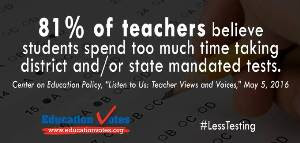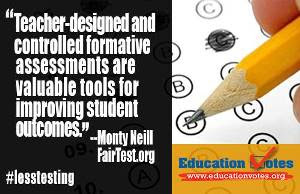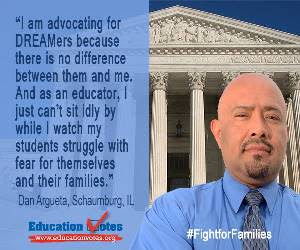News Release
Contact: Martin Ackley, Director of Public and Governmental Affairs, 517-241-4395
Kenowa Hills Educator Named
2016-17 Michigan Teacher of the Year
May 19, 2016
GRAND RAPIDS – Tracy Horodyski, described by her colleagues as passionate and excited about learning, was named 2016-17 Michigan Teacher of the Year (MTOY) today during a surprise visit from State Superintendent Brian Whiston.
Horodyski is a reading interventionist and literacy coach at Zinser Elementary in Kenowa Hills Public Schools. She has 16 years of classroom experience, and was selected from 178 nominees statewide.
“Great teachers play such an important role in preparing our children not only for college and careers ahead, but for life,” said Governor Rick Snyder. “It’s my pleasure to honor Tracy as the tremendous teacher she is, and also to recognize the huge contribution that dedicated teachers are making in classrooms across our great state."
Whiston congratulated Horodyski on this recognition: “As a teachers’ teacher who educates students and other teachers, Tracy is an extraordinary representative of our Michigan teachers and the positive impact they make on our schoolchildren. She is a living, breathing model of best practices, especially when it comes to child literacy, an area of intense focus by Governor Snyder, the State Board of Education, the Michigan Department of Education, state legislators and me.
“We look forward to her continued contributions to teaching and learning over the next year."
Whiston noted that Horodyski, who already helps her peers as a literacy coach at Zinser Elementary, will carry on the valued tradition of MTOYs who have shared their teaching knowledge, expertise, and skills with educators across the state.
Horodyski’s early career choices included dancing and physical therapy. But it was in her second year at Grand Valley State University, while writing a note of encouragement to a friend, that she found her calling.
“As I sealed the envelope of the note, I realized that I was naturally drawn to teaching,” she recalls. “I was teaching routines to my dance team, swimming lessons at the YMCA, and aerobics classes on campus – all while taking my college classes. While I had this ‘a-ha’ moment, I also realized that this shouldn’t be surprising: I was born into a family of educators. They had always been my number one supporters.”
Horodyski, the 2013-14 Certified Staff Member of the Year at Zinser Elementary, said her first year as a certified teacher was such a struggle and she mulled quitting until her uncle, a physician, shared advice that she took to heart: “Make it more about them and less about you!”
This epiphany transformed her and became what she considers her biggest accomplishment in education. “Get ready. It’s called listening,” she said. “By truly listening to, and honoring, the thinking of students, they are learning more and learning it better.”
She has taught all subjects in Kenowa Hills Public Schools since 2001, and she taught math and science while at Grand Rapids Public Schools in 1999-2000 – all at the elementary school level. But this year, her career blossomed into a new, dual role as reading interventionist and literacy coach.
As a reading interventionist, she helps identify students with reading challenges and then provides targeted support for them.
As a literacy coach, she shares Purposeful Talk, or learning through conversational techniques, with colleagues.
Described by Zinser Elementary Principal Ross Willick as spreading an infectious excitement about learning “like wildfire,” Horodyski was instrumental in introducing Classroom Learning Labs as districtwide embedded learning opportunities for other educators.
One of the four MTOY finalists with her is Kenowa Hills district colleague, Delia Bush, a fifth-grade teacher at Alpine Elementary; and the two other finalists hail from Utica Community Schools – Annette Christiansen, who teaches in grades 10-12 at Stevenson High School; and Cassandra Joss, a third-grade teacher at Burr Elementary.
They were among this year’s 178 MTOY nominees, 10 of whom were selected as semifinalists.
The Michigan Department of Education (MDE) uses this award annually to honor Michigan's exemplary educators. The State Board of Education honors the MTOY with a non-voting seat at the Board table during its regular monthly meetings, and to engage in the discussions on moving Michigan's system of education forward.
Through the corporate support of the Meemic Insurance Company, celebrating its 10th year as a proud sponsor of the MTOY program, Kenowa Hills Public Schools will receive a monetary award of $1,000 in honor of Horodyski’s recognition as MTOY, to be used for the advancement of education.
Also, Meemic will provide up to $10,000, through the MDE, for Horodyski’s MTOY-related travel during her year-long tenure, along with the opportunity to blog at www.meemic.com.
The corporate support agreement between the MDE and Meemic also includes a monetary award to be presented to the schools of each of the MTOY finalists.
The MTOY is selected by a committee that reviews nominees from teachers throughout Michigan. Nominees submit biographies and written essays that describe educational history; professional development activities; philosophy of teaching; and thoughts on emerging education trends and issues.
| 







































































No comments:
Post a Comment
Note: Only a member of this blog may post a comment.